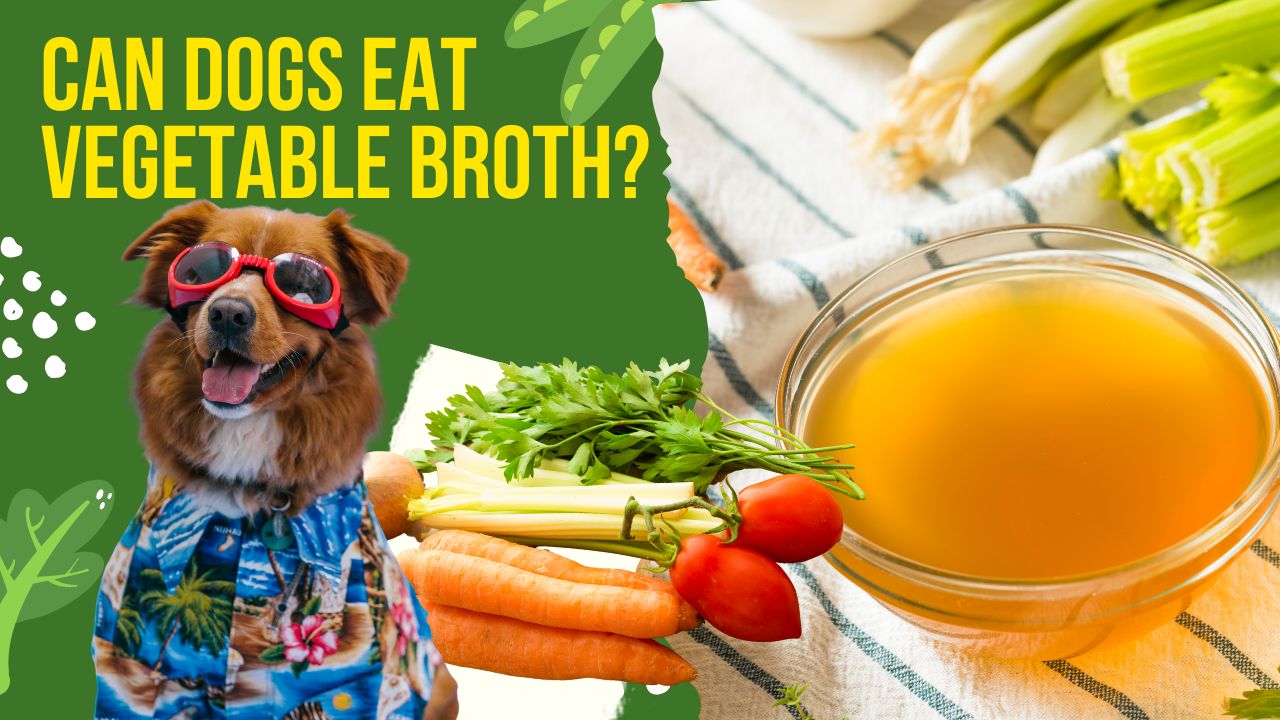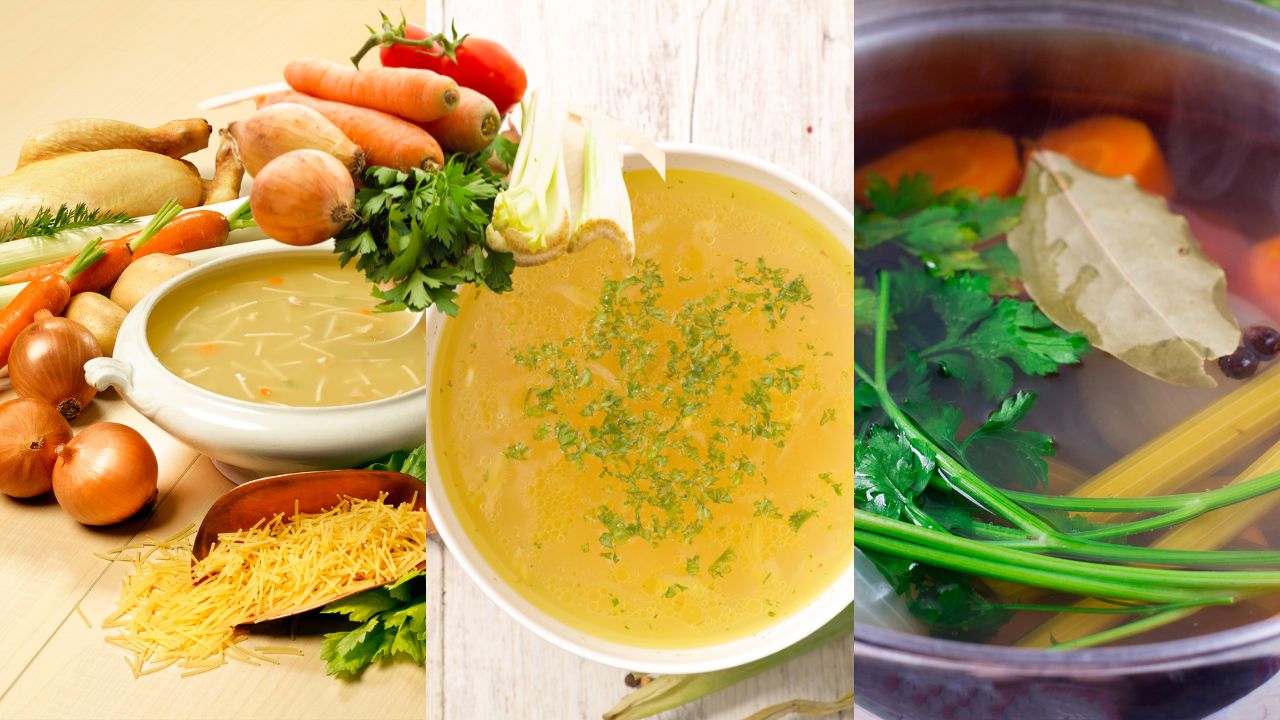
Can dogs eat vegetable broth? You ask. Vegetable broth makes a healthy alternative to regular broth in many recipes, but is it safe for dogs? Many dog owners have asked this question, and the answer may surprise you! Read on to learn more about why dogs can and should eat vegetable broth and some essential things to remember when using it in your dog’s diet.
Can Dogs Eat Vegetable Broth? The Answer, According to Experts
The best way to keep your dog healthy and happy is to provide them with the proper nutrition, including all the necessary vitamins and minerals. One of the easiest ways to do this is by making homemade dog food, though you should speak with your vet about your dog’s specific nutritional needs before doing so. If you decide to make homemade dog food, consider adding vegetable broth to the recipe! This can benefit you and your dog in several ways, as we will explore further below.

YES, They Can
Most people think that dogs are carnivores and can’t eat vegetables. But the truth is, dogs can benefit from eating certain vegetables. Vegetable broth is a great way to introduce veggies into your dog’s diet. Just check the ingredients list to ensure the broth doesn’t contain any onions or garlic, which can be harmful to dogs.
Benefits of Vegetable Broth
While there are many benefits of feeding your dog a healthy diet of whole foods, there may be times when you need to supplement their diet with something like vegetable broth. Vegetable broth is a good source of vitamins and minerals, and it can also help hydrate your dog if they’re not feeling well. However, it’s essential to ensure that the broth doesn’t contain any onions or garlic, as these can be toxic to dogs. When in doubt, always check with your veterinarian before giving your dog anything new.
5 Things to Know Before Feeding Dog Vegetables
1. Not all vegetables are created equal regarding nutrition for dogs. Some vegetables can be downright dangerous for pups.
2. Do your research to learn which vegetables are safe and nutritious for dogs and which ones to avoid feeding them altogether.
3. Always cook vegetables before feeding them to your dog, as raw veggies can be hard on their digestive system.
4. Start by introducing small amounts of cooked veggies to your dog’s diet, and watch for any adverse reactions.
5. If you’re unsure whether a particular vegetable is safe for your dog, consult with your veterinarian before feeding it to them.

Ingredients in Common Veggie-Based Dog Foods
Though there are a variety of brands and flavors, most veggie-based dog foods contain similar ingredients. Common vegetables found in these products include carrots, sweet potatoes, peas, green beans, and spinach. While some dog owners may feel comfortable feeding their pets a home-cooked meal of veggies, it’s important to note that not all vegetables are safe for dogs to consume. For example, large quantities of onions and garlic can be toxic to dogs.
5 Reasons Why I Give My Dog (And Cat) Vegetable Broth Every Day
1. It’s packed with nutrients. Like we need our daily dose of vitamins and minerals, so do our furry friends. Adding vegetable broth to your pet’s diet gives them a boost of essential nutrients that can help keep them healthy and happy.
2. It’s easy to digest. Some dogs (and cats) have sensitive stomachs and can’t handle certain foods. But the veggie broth is accessible on the tummy and can help settle an upset stomach.
3. It’s hydrating. We all know how important it is to stay hydrated, which goes for our pets, too!

Which vegetables should be avoided?
While most vegetables are safe for dogs to eat, a few should be avoided. These include onions, garlic, chives, and leeks, which can cause gastrointestinal distress. Furthermore, while some vegetables are okay for dogs to eat raw, others should be cooked before feeding your pup. For example, broccoli and cauliflower should be cooked as they may be difficult for your dog to digest raw. Finally, avoid feeding your dog vegetable scraps from the table as these may contain harmful spices or other ingredients that are not good for dogs.

When should I feed my dog vegetables and vegetable broth?
You can start feeding your dog vegetables as early as puppyhood. Adding a few pieces of cooked broccoli, carrots, or green beans to your pup’s kibble is a great way to introduce them to new flavors. As your dog ages, you can increase the number of vegetables you feed them. Adding a bit of vegetable broth to their food is also an excellent way to get them to eat their veggies!
While most vegetables are safe for dogs to eat, a few should be avoided. These include onions, garlic, chives, and shallots, which can cause gastrointestinal irritation
Cooked or raw – both are fine.
As long as the broth doesn’t contain any onions or garlic – which can be toxic to dogs – it’s perfectly safe for them to consume. Many dog owners use vegetable broth to add some extra nutrients and hydration into their pup’s diet. Just make sure you check the label to ensure there are no other ingredients that could harm your furry friend.
What Are The Best Vegetables For Dogs?
While all vegetables are not created equal, some are better for dogs than others. For example, carrots are rich in beta-carotene and fiber, which can benefit your dog’s health. Other great options include sweet potatoes, green beans, and peas. At the same time, leafy greens like spinach are packed with antioxidants. Just be sure to avoid giving your dog onion or garlic, as these can be harmful.

What to Look For
When considering whether or not to give your dog vegetable broth, you should keep a few things in mind. First, ensure the broth does not contain any onions or garlic, as these can be toxic to dogs. Second, check the broth’s sodium content and ensure it is not too high, as too much sodium can be harmful to dogs. Third, consider the fat content of the broth and whether or not it is appropriate for your dog’s diet. Finally, ask your veterinarian if you have any questions or concerns about feeding your dog vegetable broth.
The Bottom Line on Letting Your Dog Have Veggie Broth
Many people think that since the broth is made from vegetables, it must be okay for their dog to consume. However, it would help to keep a few things in mind before letting your dog slurp the veggie broth.
First and foremost, not all vegetables are safe for dogs to eat. For example, large quantities of onions and garlic can be toxic to dogs. If your broth contains either of these ingredients, it’s best to keep it out of your furry friend’s reach.
Additionally, some dogs may be allergic to vegetables commonly used in broth (such as carrots or celery). If you’re unsure whether or not your dog is allergic to a particular vegetable, it’s always best to avoid caution and feed it to them.

Conclusion
While it’s true that dogs can eat vegetables, there are some vegetables that dogs should not eat. These include onions, garlic, chives, leeks, and shallots, which can cause gastrointestinal distress in dogs. Some vegetables, like broccoli and spinach, can even be fatal if ingested by dogs in large quantities!
Rhubarb leaves are also poisonous to dogs and should not be fed under any circumstances. In addition, Raw or uncooked vegetables can also be harmful to dogs as they may contain bacteria that can cause food poisoning. So it’s essential to cook any vegetables you plan on feeding your dog before giving them to your pup.
While some experts say it’s okay for dogs to consume small amounts of vegetable broth, others believe it’s best to avoid giving it to them altogether. The main concern seems to be the sodium content in many store-bought brands. If you decide to give your dog vegetable broth, check the label and choose a product with little or no sodium. As always, consult your veterinarian if you have any questions or concerns about what’s best for your pet.

